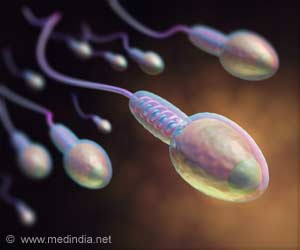Scientists say that men with either too high or too low levels of macrophage migration inhibitory factor could turn out to be infertile.
In a possible breakthrough in the research on male infertility, scientists at the Feinstein Institute for Medical Research in New York say they have found that the level of a substance called macrophage migration inhibitory factor (MIF) in semen could be the key.
The finding, detailed in the latest issue of the journal Molecular Medicine, could lead to fertility tests for males or new types of male contraception, Yousef Al-Abed and his colleagues say.They first isolated the MIF contained in semen samples collected from 68 infertile and 27 reproductively healthy men.
The samples were collected from men three to five days after a period of sexual abstinence and analyzed by scientists who had no idea which group of men the samples belonged to.
The researchers found that the infertile men had MIF levels that were either too high or too low.
When the scientists added MIF into lab dishes filled with healthy sperm, it decreased the count and impaired their motility.
Those who had no problems conceiving had levels that were just right.
Advertisement
Identified more than 40 years ago, MIF plays an important role in the immune system by promoting inflammation. It is secreted by cells in the male testis and is found in seminal fluid.
A few years ago UK cancer researchers said they had discovered a molecule that played a key role in the development of sperm.
Sperm cells develop in the testes and undergo a series of changes until they are mature and viable.
They begin life as round cells and as they mature they elongate and develop a tail.
Defects at any stage of this process can prevent the cells from maturing and lead to male infertility.
The team knocked out the function of the gene that controls production of JAM-C in mice.
They found that the male mice unable to produce JAM-C were infertile and had round instead of elongated sperm cells.
The team said the molecule was widely distributed in round sperm cells but could be found at a particularly high level on one side of the cell.
As the cells matured JAM-C was only found in the heads of elongated sperm.
The findings led the team to believe that JAM-C might have a role in defining which end of the sperm cell becomes the head.
To explore this further they studied the cellular distribution of molecules known to regulate the process.
They found that these molecules were distributed in the same areas as JAM-C during sperm development.
Lead researcher Dr Ralf Adams said: "We found that JAM-C is essential for sperm cells to mature in mice. Our results suggest that the molecule is key in determining which end becomes the head and which the tail in sperm cells."
To see if JAM-C played a similar role in human sperm, they studied its distribution in human testes.
They found a pattern that was strikingly similar to the one found in mice.
Dr Adams said: "We discovered JAM-C had a similar pattern of expression in human sperm to that found in mice. This suggests that defects in JAM-C could contribute to male infertility in humans. It will be important for scientists working in this area to investigate this further."
Source-Medindia
GPL











